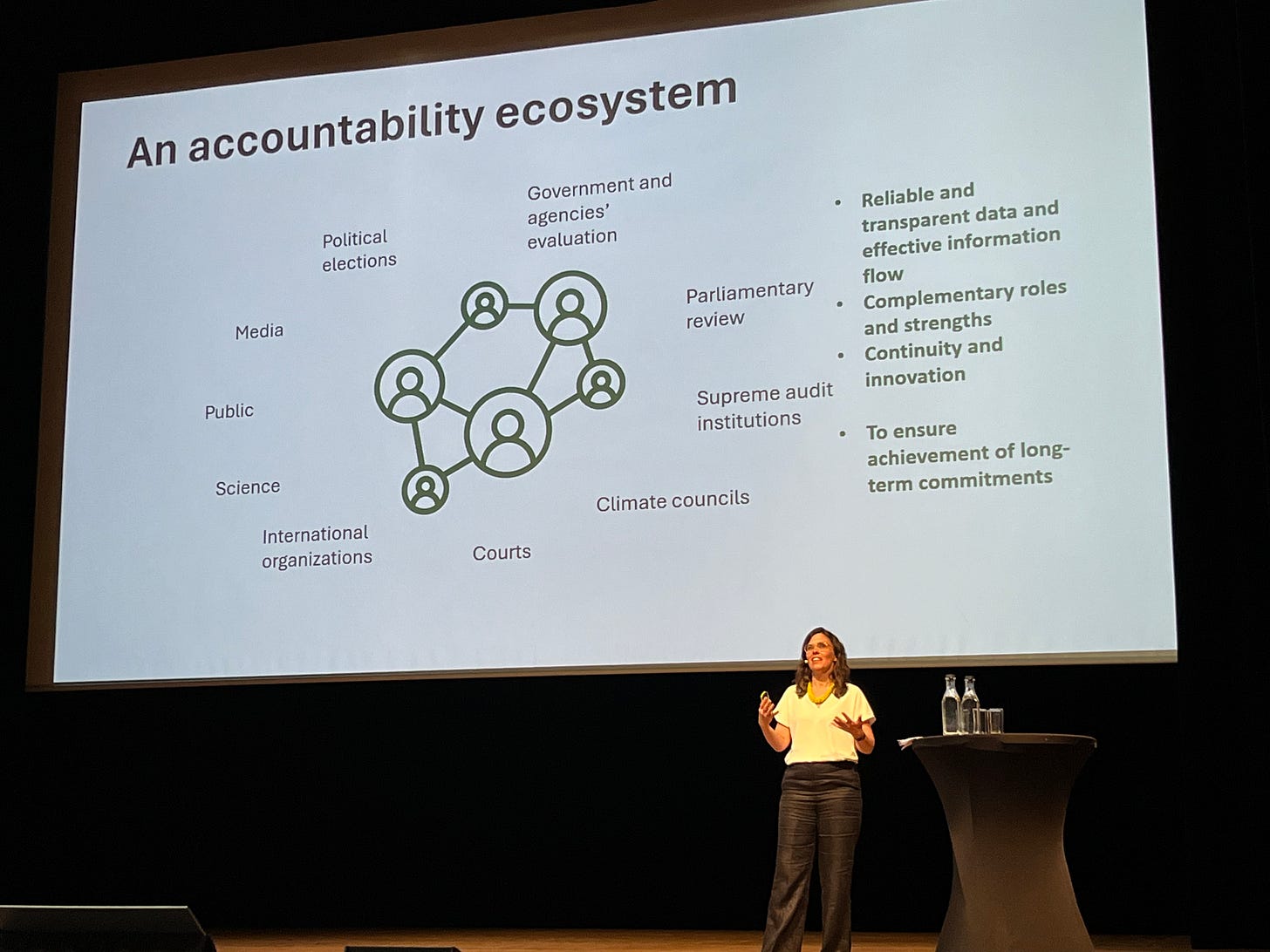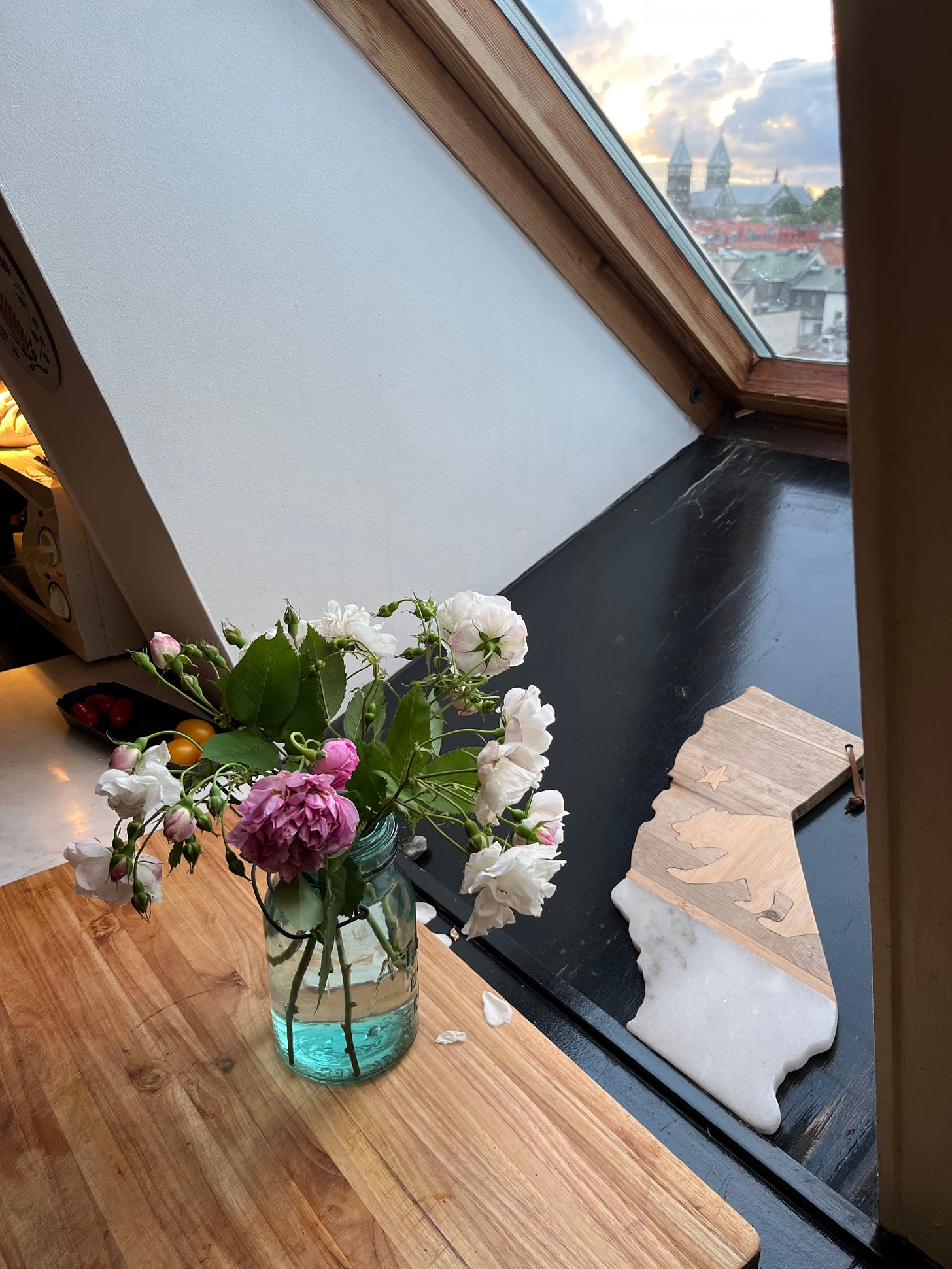Low-carbon summer
Facts: From ambition to accountability | Feelings: Tikkun olam | Action: Low-carbon summer
Welcome to We Can Fix It, where we tackle the climate crisis with facts, feelings, and action, written by me, climate scientist Kim Nicholas.
Hi friends!
I’m still working with limited capacity due to grief and some health issues. But I wanted to send this newsletter to share some news I hope you can use, and to say I’m grateful for the work you’re doing for climate, and for your kind support over these last months. Please hang in there and take care of each other!
Facts: Climate Accountability
Last month, I attended the Swedish Climate Symposium and heard an excellent talk by Prof. Åsa Persson, Chair of the Swedish Climate Policy Council. (That’s a group of scientists who evaluate how well our government is doing on meeting national climate goals.)
Åsa made many smart observations on the current climate policy landscape:
We’re moving from the age of
climate action (acknowledging the need to act) →
to climate ambition (announcing targets) →
to climate accountability (implementing policies and practices that deliver emissions reductions and meet targets).The initial focus after the Paris Agreement was adopted in 2015 was pledges, with the goal to bring actors onboard. It was a low threshold; any target was welcome.
Now we’re in an era of scrutinizing government and corporate targets, and developing standards for what constitutes a good target.
Targets are usually politically easier to adopt than policy instruments, because targets don’t assign responsibility, allocate costs, or have to be completed within the current term of office.
Policy instruments (like taxes, subsidies, regulations, standards, information, public goods) usually assign responsibility and imply distribution of costs and benefits, which motivates actors to mobilize (including resistance).
What will enforce the Paris Agreement are implementation plans. Countries should adopt redistributive climate policies to build social acceptance.
The climate transition should be both
just (leaving no one behind, including fossil fuel workers and frontline communities) and
orderly (avoid delays from poor coordination, do things in the right order, follow a pace of change that balances costs and benefits over time and gives actors time to adapt).
To deliver climate targets in reality, Åsa proposed a climate “accountability ecosystem,” with important roles for evaluation, audit, and assessment of climate progress, as well as input from the public and civil society, scientists, and the media. I’d say you’re part of this ecosystem as a We Can Fix It reader, so thank you!
Feelings: Tikkun Olam
I recently learned of two concepts from the Talmud that really resonated for me, thanks to social justice advocate Sim Kern on Instagram:
Tikkun olam, action to repair the world.
As Sim describes it, this is the view that our purpose is healing ourselves and the world.“You are not obligated to complete the work, but neither are you free to abandon it.”
As Sim points out, this means that you can focus your energies where you feel they make the most difference, because so many others are also working to heal different parts of the world.
To me, this combination is really powerful. We have an essential purpose that matters to ourselves and others. It acknowledges that the work can be hard, and it may not be done in our lifetimes, but it’s still worth doing.
You can watch Sim’s full video here:
Action: Low-carbon summer adventure
Summer means longer days and perhaps time for vacation. It’s a great time to get outside. (I recently passed 500 hours outside so far in 2024, hopefully on my way to 1,000 hours outside for the year.) And it's a great time to enjoy some of the simple pleasures of life.
Your action this month is to enjoy some low-carbon fun, relaxation, and adventure. (This means reducing flying and driving as much as possible.)
Some ideas:
Get a summer transit pass and explore your local area. You could pick a theme to visit like excellent hikes, breweries, or cardamom rolls (just to name a few faves!)
Try a new activity that’s powered by your body (like biking or standup paddleboarding) or the wind (like sailing, which Simon and I are learning from scratch after we bought a 1976 Maxi 77 sailboat last year).
Grow something you’ll enjoy to eat or to look at in your garden or windowsill. This summer I’m enjoying growing and arranging flowers in memory of my mom.
Visit a local farmers’ market and collect treats to have at a picnic in the park.
Go to a local beach, lake, or pool and take a dip.
Keep it simple! As I wrote in Under the Sky We Make, “A lot of changing your life for the sake of the environment means trying way less hard, not more. British researchers identified activities to live better and happier while consuming and emitting less; they found the best win- win leisure choices are local outdoor activities, reading, hobbies and games, music, and— lowest emitting of all—“sleep and rest.” Science says: more naps!”
For tips on how to connect with and care for nature nearby, see my April 2021 post “A hot date with Planet Earth.”
Parting Tidbits
I spoke with Josh Spodek about my flying less journey, and why cultural change is essential to climate action, on This Sustainable Life podcast:
Book Recommendation:
Not the End of the World, by Hannah Ritchie. I recently recommended this book to a high school science teacher for her science class. It’s a very good, accessible overview of not just environmental problems, but also where we’ve made progress and what more we can do.
I’ll be taking holiday in July, so I’ll see you back here in August. Thanks so much for reading.
xo,
Kim





I love the insights from the Talmud- thanks for sharing!